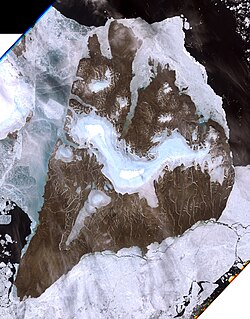Cape Peschany
Geography
Stretching out northwards NW of the Akhmatov Fjord and east of the mouth of Mikoyan Bay, this headland is the northernmost point of Bolshevik Island.
Cape Unslicht is one of the landmarks defining the limits of the Laptev Sea according to the International Hydrographic Organization.
History
The Laptev Sea shore of present-day Severnaya Zemlya was discovered by Boris Vilkitsky in 1913 during the Arctic Ocean Hydrographic Expedition on behalf of the Russian Hydrographic Service, but he was unaware that there was a strait west of the cape between what is now Bolshevik Island and the islands further north, for the straits are frozen most of the year, forming a compact whole.
Named during the 1930–1932 expedition to the archipelago led by Georgy Ushakov and Nikolay Urvantsev after Zofia Unslicht, a German communist figure, this headland was renamed Mys Peschanyy (Sandy Cape) in Russian, following World War II.
There was a weather and scientific station near the cape, Peschanny Polar Station, now abandoned.
 |
 |
See also
References
- ^ "Mys Peschanyy". Mapcarta. Retrieved 27 November 2016.
- ^ "Limits of Oceans and Seas, 3rd edition" (PDF). International Hydrographic Organization. 1953. Archived from the original (PDF) on 8 October 2011. Retrieved 29 December 2020.
- ^ Barr, William (1975). "Severnaya Zemlya: the last major discovery". Geographical Journal. 141 (1): 59–71. doi:10.2307/1796946.
- ^ "Октябрьской Революции Остров" Great Soviet Encyclopedia
- ^ "Архипелаг Северная Земля — один из наиболее крупных районов оледенения на территории России". Archived from the original on 2016-11-24. Retrieved 2016-11-27.
- ^ "Word Pro - Die Komintern.lwp - Internationale Sozialisten" (PDF). Archived from the original (PDF) on 2016-11-27. Retrieved 2016-11-27.
- ^ Operational Navigation Chart B-3, 2nd edition